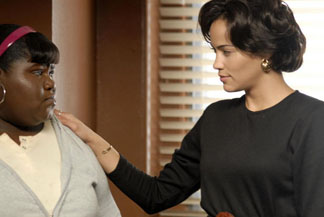Movie Review: Precious
By Matthew Huntley
November 27, 2009
BoxOfficeProphets.com

Key to the film's success is the fact that it doesn't take pity on its heroine, a 16-year-old black girl named Precious (Gabourey Sidibe in a breakthrough performance). Instead, it shows her as a strong-willed person determined to overcome her problems in her own way. Precious has an inordinate amount of struggles — she's overweight; she has a darker complexion than most of her classmates; she's repeating junior high school; she's pregnant with her second child; she lives with a verbally and physically abusive mother (Mo'Nique, very effective); and she was raped by her own father.
But despite all its heavy drama, Precious always powers forward. What's refreshing is the film doesn't dwell on Precious' obstacles, but focuses more on her perseverance and the opportunities that allow her to escape her situation. It neither condescends nor provides false hope, which is more impressive when you imagine how easily the screenplay could have caved and taken a familiar, made-for-TV route. For instance, we learn Precious has a gift for math, and it would have been easy for the film to let her become a prodigy of some sort and let that be her ticket out. But the film is more truthful than that; Precious escapes a dire fate not because of simple plot devices, but because she's inherently strong, smart, and, on a certain level, charming.
Her story takes place in Harlem, 1987. When the principal (Nealla Gordon) learns Precious is pregnant again, she's forced to expel her, but she makes the trek to Precious' apartment to inform her about an alternative school so Precious can get her G.E.D. Here, Precious meets Miss Weiss (Paula Patton), who doesn't tiptoe around or feel sorry for her students but pushes them to overcome their odds. When Precious discloses some heartrending news, Miss Weiss doesn't weep for her like we expect. No, she encourages her to write about it, because she'll probably never feel this way again and it's best to put her feelings on paper. That's just one of the scenes where Precious surprises us.
The film isn't always easy to watch. A lot of it revolves around Precious' relationship to her abusive mother, who treats her daughter like a slave. And because the performances are so strong, we believe their current situation, even though it may seem over the top at first. When Precious brings home her newborn son, our hearts sink at the way the mother treats it and we realize the film will take any direction necessary to fuel its effective story.
Precious could have been another one of those Hollywood black films that glorifies and over-dramatizes inner city life, but it's more special and unique. It's not trying to make a blanket statement about black people; it's exclusively about this young woman's journey and we become engulfed in it. Along with its two leads, director Lee Daniels is guaranteed an Oscar nomination. Daniels invokes the film with a glorious visual style and tempo that constantly keep it moving. His vision is in perfect sync with Geoffrey Fletcher's screenplay, from the novel Push by Sapphire, especially in regards to the darker scenes and fantasy moments. Precious often imagines herself as someone else in order to escape reality (often as a celebrity or the object of one man's desire) and I appreciated that Daniels kept Sidibe in these scenes, which allows us to see just how beautiful the young actress is and that beauty comes in all shapes and sizes.
Sure to leave an imprint on viewers' minds and hearts is the final confrontation between Precious, her mother and a welfare agent (Mariah Carey). In it, Precious' mother attempts to justify her behavior and disclose why she's so mean to her daughter. The scene is so powerful we feel like crying at the mere thought of it. Make note of Carey's reaction to Mo'Nique's words — I don't think she's acting, but really paying attention to the lines being spoken, which are incredibly moving. What happens after is perfect vindication that reinforces why we care about Precious so much. We love her and want her to prevail. Whether she does or not isn't important; what matters is she keeps trying and we keep hoping. Precious is an unforgettable film.